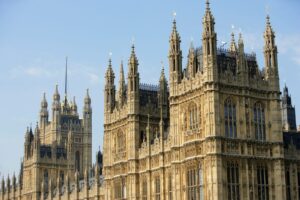With election day finally upon us, Michael Wilson wishes the politicians would put a bit more forethought into what they decide
A fair few years ago, the town council in one of our local tourist hotspots got itself into the papers for all the wrong reasons. Tired of seeing young people squatting around on the pavements, clutching cans of White Lightning or Special Brew in their groggy mitts, it resolved to clean up the town with one simple manoeuvre. It would ban all consumption of alcoholic beverages in the public spaces around the tourist heart of town.
Mouth In Motion, Brain In Gear?
It was such a good idea at the time that the councillors immediately approved it. Within weeks, the necessary byelaws had gone off to parliament to be ratified, the police had been briefed about the new offence, and fifty shiny new street signs had been erected to tell the public to stick to soft drinks if they wanted to avoid a night in the cells.
Result: within three weeks, the council was well on the way to putting all the pavement cafes out of business. When they protested about being unable to serve drinks out front, the elder council statesmen went duhhhhh, we didn’t mean that. But a law was a law, and the police had to enforce it, and so the pesky byelaw went back to parliament for another lengthy modification. By the time it was resolved and another expensive set of signs with altered wording had gone up, the city’s bars had lost a goodly chunk of their summer income. Permanently.
For Whom the Poll Tells, It Tells for Thee
Return to the present day, and what do we find? Now, of course, i s the time for all good men to come to the aid of the party. But hey, you’d already noticed that. What you’ve also noticed, probably, is the horrible anxiety with which every politician seeks to curry your favour in advance of the 7th May poll. And who can be surprised if their wish-fulfilment sometimes gets ahead of their thinking?
s the time for all good men to come to the aid of the party. But hey, you’d already noticed that. What you’ve also noticed, probably, is the horrible anxiety with which every politician seeks to curry your favour in advance of the 7th May poll. And who can be surprised if their wish-fulfilment sometimes gets ahead of their thinking?
Housey Housey
Take, for example, David Cameron’s recent surprise announcement that homes worth up to £1 million won’t put you into the inheritance tax bracket if we re-elect the Conservatives to power in May. Well, it was a good headline at the time, but actually it means you can reckon on leaving a million tax-free when you die. (That’s a £175,000 tax-free allowance per person for the house, plus the standard IHT allowance of £325,000, which adds up to a combined £1,000,000 if you’re the surviving partner of a marriage or civil partnership.)
You can see how Cameron’s advisers must have been thinking. What better way could there be to reinforce and reward traditional family values – home-ownership, marriage, saving for your old age, and all the rest of it? What a great way to secure the grey vote and stop it drifting away to Nigel Farage (who promises to abolish IHT altogether, by the way.) But that’s where the thinking ran out and the unseemly haste of the ballot campaign took over.
Just what sort of a message was the Prime Minister giving out to the young people with no current hope of getting onto the housing ladder? That their parents’ advantage over them was now being locked in permanently? That the so-called ‘Rent Generation’ (many of whom have adopted that lifestyle from choice because of the greater job mobility it gives them) are to bear a permanent structural disadvantage? How’s that supposed to help?
And what about all those parts of the country outside the overpriced south-east, where a veritable palace won’t get you even halfway to the million pound mark? Didn’t that smell like a special sop to the softy southerners?
Unfortunately it gets worse. Whether the PM realises it or not, he’s encouraging the oldies to hang onto their six bedroom houses until death – whereas last year he was gently plugging the advantages of downsizing and taking the cash. Given the choice between shelling out 40% of that cash to HMRC upon your death or hanging onto your IHT-free bricks and mortar until you croak, which would you choose? And won’t that just add to the scarcity of larger houses for families? And to still higher prices?
It doesn’t seem to fit too well with the home ownership strategy for younger people. But relax, Mr Cameron will have plenty of time to get the workarounds into place before the change becomes law next year. It’s just that he may have raised hackles that weren’t strictly necessary.
Scrambling at the FCA
Chancellor George Osborne had a bit more time in which to get his pension ducks into a row, but somehow he didn’t seem to make much of a job of it. Having announced last March that from this April Defined Contribution pension holders would be entitled to withdraw their pension funds in cash – or, more sensibly, in several instalments, so as not to incur top-rate tax charges – he seemed to have left the industry pretty much in limbo while it waited for further guidance.
That deafening silence that you heard through most of last year wasn’t the sound of fund managers eagerly chewing their pencils as they figured out new ways of helping their clients to make the most of the new freedoms. It was sound of the industry waiting patiently for the other shoe to fall off the shelf.
The FCA itself was eventually obliged to introduce this spring’s Pension Wise service pretty much on a wing and a prayer – ‘provisional’ was the kindest thing we could say about the plans for the new service when they emerged on 27th February in the shape of Policy Statement PS 15/4 (“Retirement Reforms and the Guidance Guarantee”). And even then, the regulator conceded that, although it expected advisers and everyone else to be ready for the new rules on 6th April, it hadn’t actually reached a full and final decision on what those rules would actually be. Instead, it was forced to launch another Consultation Paper, CP 15/12 (“Pension Wise – Recommendation Policy”), which it hoped would get it all sorted by the summer of 2015.
Maybe we shouldn’t be too shocked by the fact that the Pension Wise computers collapsed in a heap when the service was finally launched. You can’t do much about five million people all wanting to see a website at once. But surely there had to be a better way? And what about the promise that Pension Wise and the others would be dispensing free advice? It now seems that ‘advice’ consists of setting out the options without making suggestions. Which is not what most unsophisticated clients understand by advice at all. Is it, now?
DC Calling
If all that sounded undignified, the garbled way that the Defined Benefit-to-Defined Contribution rules emerged was close to farce. It had started well enough, with the Chancellor intimating last April that DB holders would be able to chop in their pensions for DC systems. That sounded good to a lot of public service pension holders too – except that half of them were in for a disappointment.
For some reason, the really bad news didn’t get out until after last autumn’s party conference season was safely out of the way. While most local government officials would indeed be eligible to transfer their pensions out to a DC system, a great many central government employees – including teachers, doctors, nurses, civil servants, firefighters and police – would be disbarred. For the very good reason, it seemed, that these people’s schemes were ‘unfunded’ – meaning that nobody had built up a pension fund for them, preferring instead to rely on paying their pensions out of current income in the future.
You can’t cash in a pension plan that doesn’t have any money in it. It’s plain good sense but bad politics. One way and another, it isn’t a huge surprise that a lot of voters were getting angry and frustrated about all this.
Put Your Tongue Out and Say Aaaaah
Not to mention the millions who had already bought an annuity, and who were feeling distinctly miffed about having missed the pension freedom’s party. So there was yet another gap waiting to be filled. Which the Chancellor duly did by announcing in the 2014 Autumn Statement that even annuity holders would be able to flog their contracts on the open market for whatever they could get for them.
No, he didn’t say that, of course, but that’s how it’s looking at present. Any financial house that’s thinking of buying your annuity is going to need to take a cold, hard actuarial look at how long you’re likely to last. Smoker? A bit of angina? When did your parents die? All that personal stuff. And then it’ll deduct a goodly whack for safety, and you’ll probably get 60-80% of what it considers to be the ‘net asset value’ of your remaining years.
Okay, Advisers, You Sort It Out
So guess what, the FCA is now warning that too many confused pensioners are going to make bad choices in a confused regulatory environment, and that advisers should now be required to give them the third degree so that they don’t fall into the expectation traps that the government itself has been laying out for them.
CP 15/7, the “Proposed Changes to Pension Transfer Rules”, wasn’t published until 5th March, and it won’t be in a position to produce guidance until June (you guessed it). In the meantime, however, CP 15/7 says that you, Dear Reader, are going to have to raise your game. I quote:
‘The new regime will also make advising on pension transfers significantly more complex, so we now wish to require the Pension Transfer Specialist qualification for advice on all transfers from DB schemes to DC arrangements, regardless of when the transferred benefits are being accessed. In particular, the regulator proposes to:
- Amend the rules to incorporate the new specified activity of advising on conversions or transfers of safeguarded benefits to flexible benefits, and
- Require that all advice on DB to DC pension transfers be provided or checked by a Pension Transfer Specialist’
It’s undignified and it’s messy, and once again the lack of regulatory detail has been fairly shocking. The Chancellor has been moving too fast (as he would put it) for the industry to keep up. The way I’d put it, however, is that we’re seeing big policy decisions being made on the hoof, with the gap-plugging and contradiction-fixing six months down the line.
Non-Doms
Lest I give the impression that all my spite and bile is directed at the Tories, maybe I should observe that the serving government is where blame naturally tends to fall. And that this year the Labour front benches have given us no more reason to expect clear thinking.
Take, for instance, Ed Miliband’s pledge to abolish non-dom status for the 116,000 foreign foreign citizens who currently reside in Britain and claim non-dom status. (Slightly less than the 123,000 in 2008/9.) According to the Daily Telegraph, each of these paid an average £72,671 in tax during the 2012/13 tax year, a total of £8.2 billion – up from £5.9 billion in 2008/9.
We could argue forever about how many non-doms would really leave the country if a Labour government abolished the deal whereby they receive an exemption from overseas earnings and capital gains. (The usual estimate from the tax lawyers is 30,000. But then, they would say that, wouldn’t they?) What’s certain is that the non-doms pay a flat fee of £30,000 year for the privilege – soon to rise to a maximum £90,000 – and that that cash would now disappear. The Institute for Fiscal Studies says that the overall impact of the policy is so uncertain that it could conceivably raise “less than zero”.
Which is why it’s a bit embarrassing that shadow Chancellor Ed Balls said exactly that on camera earlier this year – see http://tinyurl.com/lnq2cec if you don’t believe me. Not for the first time, Mr Cameron had the right to accuse Labour of ‘chaotic’ policy management.
And what happens to dual taxation arrangements if we start charging foreigners tax that they’ll want to discount from their tax bills in their homelands? Oh, for sure, the change will be necessary, but it does highlight the trouble we can get into when one country starts to go all extraterritorial with its tax demands. Just ask anyone who’s tangled with America’s Internal Revenue Service.
Of course, it’s always good politics to have slap taxes on foreigners who don’t have votes – as France’s President François Hollande has also been happy to confirm in recent years. But I’ll be happier when all this is over, one way or the other, and we can get down to some proper thinking about future economic policy instead of grabbing at every attractive straw as if it were an electoral lifeline, only to find out – alas, too late – that the complications were worse than expected. The public deserves better.















